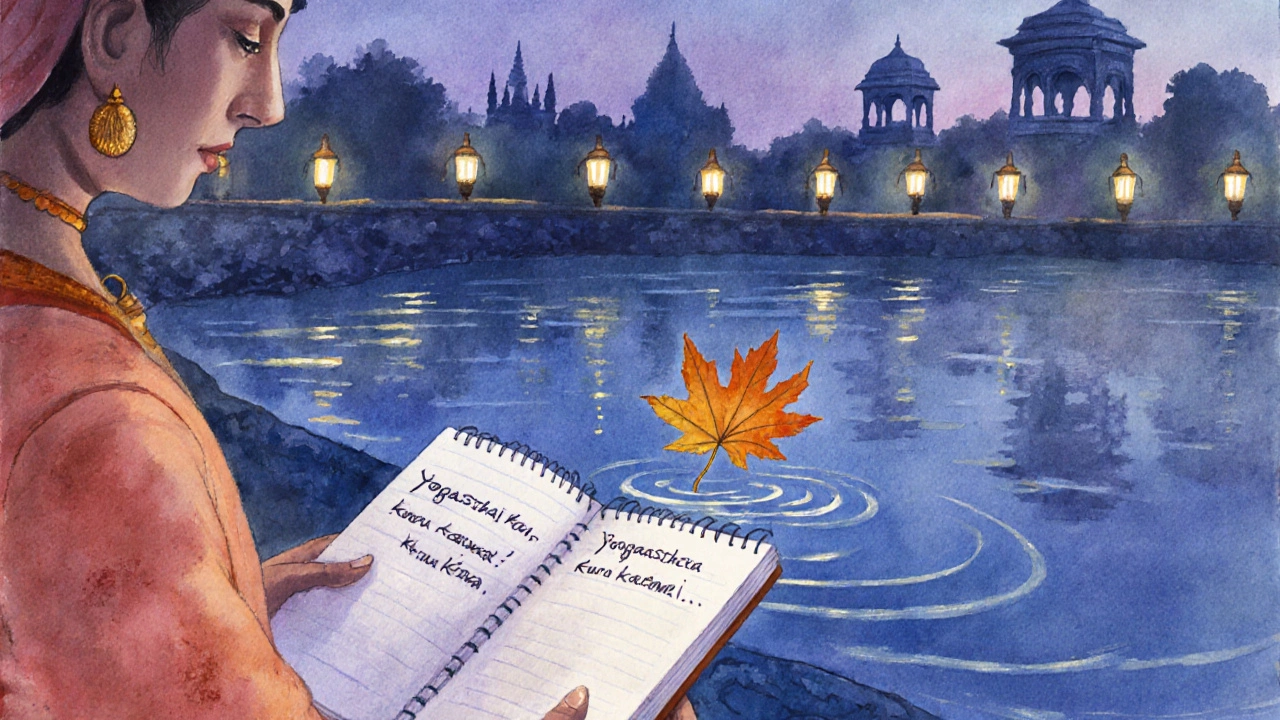What is the Hindu Quote for Peace? Meaning, Sources, and How to Use It

Hindu Peace Quote Practice
Select a Peace Quote
Shanti shanti shanti
Threefold peace for the self, the world, and the divine.
Perform your duties while remaining attached to nothing.
Detachment creates internal calm.
The world is one family.
Seeing all as kin eliminates hostility.
Truth alone triumphs.
Living truthfully removes inner conflict.
Practice Guide
Select a quote to begin your practice
Choose a Hindu peace quote that resonates with you and follow the guided instructions to cultivate inner calm.
When you search for a calm mantra to lift your spirit, a single line from ancient Hindu wisdom often pops up: Hindu quote for peace. But which verse truly captures the depth of inner tranquility that Hinduism teaches? Below we unpack the most celebrated Hindu peace sayings, trace them back to their scriptural homes, and show practical ways to weave them into modern life.
What "Shanti" Means in Hindu Thought
Shanti is a Sanskrit word meaning "peace," "calm," or "silence." In Hindu philosophy, Shanti isn’t just the absence of noise; it’s a balanced state of mind where the ego‑self harmonizes with the universal self (Atman). The term appears throughout Vedic chants, Upanishadic dialogues, and daily prayers, often repeated three times-"Shanti, Shanti, Shanti"-to cleanse the mind, body, and environment of disturbance.
Scriptural Roots of Hindu Peace Sayings
Hindu literature is a sprawling tapestry of stories, hymns, and treatises. Several major texts contain verses that scholars and seekers alike cite when they need a dose of calm.
- Bhagavad Gita: The battlefield dialogue where Krishna advises Arjuna to act without attachment, likening true peace to a steady mind amid chaos.
- Upanishads: Philosophical books that reveal the inner silence (Turiya) as the ultimate reality.
- Mahabharata: The epic war narrative that includes the famous "Shanti" mantra at the start of each chapter.
- Ramayana: Rama’s exile provides multiple reflections on inner steadiness.
Even modern visionaries like Mahatma Gandhi borrowed these ancient lines, turning them into rallying cries for non‑violence and communal harmony.
Top Hindu Quotes that Embody Peace
Here are the most quoted verses that people reference when they search for a "Hindu quote for peace." Each line is followed by a brief context and a modern‑day interpretation.
- "Shanti shanti shanti" - Rig Veda (Verse 1.1.2).
Threefold peace for the self, the world, and the divine. Use it as a simple mantra before meditation. - "Yogasthaḥ kuru karmāṇi saṅgaṃ tyaktvā dhanañjaya" - Bhagavad Gita 2.48.
"Perform your duties while remaining attached to nothing." Detachment creates internal calm. - "Aham brahmāsmi" - Bhagavad Gita 10.20.
"I am Brahman (the ultimate reality)." Recognizing oneness dissolves fear and brings peace. - "Sarva dharmān parityajya mām ekaṁ śaraṇaṁ vraja" - Bhagavad Gita 18.66.
Abandon all worldly loyalties and surrender to the Divine; surrender is the gateway to serenity. - "Satyam eva jayati" - Mahabharata, Anushasana Parva.
Truth alone triumphs; living truthfully removes inner conflict. - "Om shanti shanti shanti" - Closing chant of most Hindu rituals.
Invokes peace for the individual, the community, and the cosmos. - "Yatha pinde tatha brahmane" - Chandogya Upanishad.
As the body is, so is the soul; align bodily health with spiritual calm. - "Vasudhaiva kutumbakam" - Mahabharata, Shanti Parva.
The world is one family; seeing all as kin eliminates hostility.

How to Bring These Quotes into Everyday Life
Knowing a quote is one thing; living it is another. Below are actionable steps to let these sayings shape your day.
- Morning mantra: Start with "Shanti, Shanti, Shanti" while inhaling and exhaling slowly for three breaths each.
- Detachment practice: When faced with a stressful task, recall Gita 2.48. Write down the outcome you fear, then mentally place it on a leaf and let it float away.
- Truth check: At the end of each day, ask yourself if you acted in alignment with "Satyam eva jayati." If not, note a small corrective action for tomorrow.
- Community service: Embrace "Vasudhaiva kutumbakam" by volunteering once a month; connecting with strangers expands your sense of unity.
- Evening reflection: Sit quietly, repeat "Om shanti shanti shanti," and visualize a peaceful sphere surrounding you.
Common Misinterpretations to Avoid
Even beloved verses can be twisted. Here are pitfalls to watch for.
- Detachment = apathy: Gita 2.48 encourages action without craving results, not ignoring responsibilities.
- Peace as passivity: The mantra "Shanti" is a call to inner stillness that fuels outward compassion, not inactivity.
- Selective quoting: Picking only uplifting lines without understanding the broader narrative can lead to shallow practice.

Quick Reference Cheat Sheet
| Source | Quote (Sanskrit) | English Meaning | How to Apply |
|---|---|---|---|
| Rig Veda | शान्तिः शान्तिः शान्तिः (Shanti shanti shanti) | Peace, peace, peace | Use as a calming mantra before meditation |
| Bhagavad Gita 2.48 | योगस्थः कुरु कर्माणि सङ्गं त्यक्त्वा धनञ्जय (Yogasthaḥ kuru karmāṇi saṅgaṃ tyaktvā dhanañjaya) | Perform duties without attachment | Write down anxieties, release them on a leaf |
| Mahabharata, Shanti Parva | वसुधैव कुटुम्बकम् (Vasudhaiva kutumbakam) | The world is one family | Engage in community service monthly |
| Chandogya Upanishad | यथा पिण्डे तथा ब्रह्मणे (Yatha pinde tatha brahmane) | As the body, so is the soul | Maintain physical health to support spiritual calm |
| Mahabharata, Anushasana Parva | सत्यं एव जयति (Satyam eva jayati) | Truth alone triumphs | Daily truth‑check in a journal |
Frequently Asked Questions
What does "Shanti" actually mean?
In Sanskrit, "Shanti" translates to peace, calm, or silence. Hindu traditions view it as a deep inner equilibrium that arises when the mind is free from desire and disturbance.
Which Hindu scripture contains the most famous peace mantra?
The three‑fold "Shanti, Shanti, Shanti" appears in the Rig Veda, but it is also the closing chant of most Hindu rituals and is quoted throughout the Upanishads and the Mahabharata.
How can I use a Hindu peace quote during stressful work days?
Pick a line like Gita 2.48, write it on a sticky note, and glance at it before each major task. Pair it with a brief breath‑pause: inhale, repeat the verse silently, exhale, and proceed.
Is "detachment" in the Gita a call to be indifferent?
No. Detachment (Vairagya) means performing actions without selfish craving for results. It frees you from anxiety, which is the real path to peace.
Can I recite these quotes without knowing Sanskrit?
Absolutely. Many modern translations preserve the essence. You can chant the phonetic version or use the English meaning; the intention creates the calm.
Whether you’re seeking a quiet moment before a meeting or a lifelong guide to inner balance, the Hindu tradition offers a rich library of peace sayings. Pick the one that resonates, practice it consistently, and watch the ripple of calm spread through your thoughts, actions, and relationships.